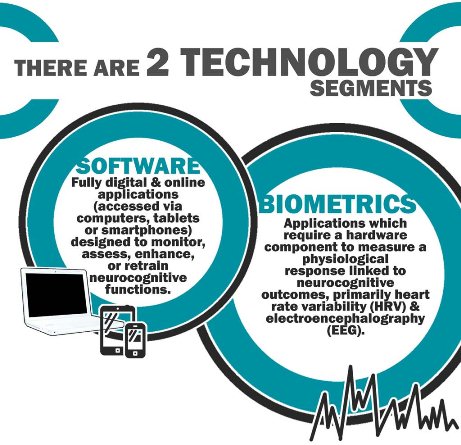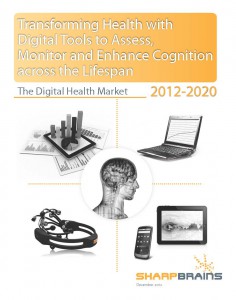Digital Brain Health vs Brain Training vs Brain Games
 The Digital Brain Health market can be broken down into two main technology segments:
The Digital Brain Health market can be broken down into two main technology segments:
- Software — refers to fully digital and online applications (accessed via computers, tablets or smartphones) designed to monitor, assess, enhance, or repair neurocognitive functions.
- Biometrics — refers to applications which require a hardware component to measure a physiological response linked to neurocognitive outcomes, primarily heart rate variability (HRV) and electroencephalography (EEG).
 And here are a few examples of what we mean by Digital Brain Health (fully automated applications designed to assess, monitor and/ or enhance cognition and brain functioning), selected from among the 5 Market Leaders and 10 Companies to Watch in 2013/2014:
And here are a few examples of what we mean by Digital Brain Health (fully automated applications designed to assess, monitor and/ or enhance cognition and brain functioning), selected from among the 5 Market Leaders and 10 Companies to Watch in 2013/2014:
- A 30-minute online brain health assessment and personalized brain fitness program used by large companies like Nationwide Insurance and Accenture to improve employee’s productivity and mental wellness
- An online cognitive training program offered by several large AAA chapters to members age 50+ to improve driving safety
- A computerized cognitive behavioral therapy offered by the NHS in the UK as a first-line intervention for anxiety and depression
- A fully digital headset and platform that measures basic brain states (such as level of attention) and is being used to help people meditate better and reduce ADHD symptoms
- An iPad-based assessment that tracks cognitive performance over time to help detect concussions among football/ hockey players and military personnel
These examples are critical to understand the marketplace and real transformation underway — which has not been properly reported yet by the media, given the superficial controversy over Nintendo brain training and similar “brain games.”
To Learn More about the report Transforming Health with Digital Tools to Assess, Monitor and Enhance Cognition across the Lifespan: The Digital Brain Health Market 2012–2020:


